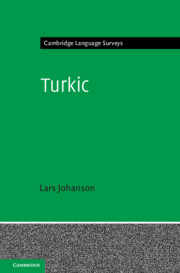Book contents
- Turkic
- Cambridge Language Surveys
- Turkic
- Copyright page
- Contents
- Figures
- Maps
- Tables
- 1 Introduction
- 2 Technicalities
- 3 The Turkic Language Family
- 4 Turcia, the Turkic World
- 5 Status
- 6 Historical Backgrounds
- 7 Cultures
- 8 Linguistic Periodizations
- 9 Registers of Orature and Literature
- 10 Language Contacts
- 11 Lexicon
- 12 Sound Types
- 13 Prime Syllables
- 14 Phonemes in Prime Syllables
- 15 Polysyllabic Word Forms
- 16 Diachronic Phonology
- 17 Diachrony: Vowels
- 18 Diachrony: Consonants
- 19 Writing Systems
- 20 Morphology: Generalities
- 21 Nominals: Nouns
- 22 Nominals: Noun Inflection
- 23 Nominals: Adjectives
- 24 Nominals: Pronominals
- 25 Quantifiers and Numerals
- 26 Postpositions
- 27 Copular Devices
- 28 Verb Stems
- 29 Postverbial Constructions
- 30 Finite Verbals
- 31 Verbals: Viewpoint Aspect
- 32 Old Intraterminals: Aorists
- 33 Focal Intraterminals
- 34 Postterminals
- 35 Terminals
- 36 Imperatives
- 37 Modality
- 38 Voluntatives
- 39 Optatives
- 40 Hypotheticals
- 41 Further Modals
- 42 Copular Particles of Thematic Bases
- 43 Nonfinite Verbals
- 44 Participant Nominals
- 45 Action Nominals
- 46 Converbs
- 47 Adverbs
- 48 Function Words
- 49 Interjections
- 50 Word Accents
- 51 Syntactic Levels
- 52 Nominal Phrases
- 53 Verbal Phrases
- 54 Main Clauses
- 55 Nonmain Clauses
- 56 Sentences
- 57 Above the Sentence Level
- 58 Prosody
- 59 Functional Synopses
- References
- Index of linguistics and historical backgrounds
- Index of languages and dialects
- Index of subjects
34 - Postterminals
Published online by Cambridge University Press: 13 August 2021
- Turkic
- Cambridge Language Surveys
- Turkic
- Copyright page
- Contents
- Figures
- Maps
- Tables
- 1 Introduction
- 2 Technicalities
- 3 The Turkic Language Family
- 4 Turcia, the Turkic World
- 5 Status
- 6 Historical Backgrounds
- 7 Cultures
- 8 Linguistic Periodizations
- 9 Registers of Orature and Literature
- 10 Language Contacts
- 11 Lexicon
- 12 Sound Types
- 13 Prime Syllables
- 14 Phonemes in Prime Syllables
- 15 Polysyllabic Word Forms
- 16 Diachronic Phonology
- 17 Diachrony: Vowels
- 18 Diachrony: Consonants
- 19 Writing Systems
- 20 Morphology: Generalities
- 21 Nominals: Nouns
- 22 Nominals: Noun Inflection
- 23 Nominals: Adjectives
- 24 Nominals: Pronominals
- 25 Quantifiers and Numerals
- 26 Postpositions
- 27 Copular Devices
- 28 Verb Stems
- 29 Postverbial Constructions
- 30 Finite Verbals
- 31 Verbals: Viewpoint Aspect
- 32 Old Intraterminals: Aorists
- 33 Focal Intraterminals
- 34 Postterminals
- 35 Terminals
- 36 Imperatives
- 37 Modality
- 38 Voluntatives
- 39 Optatives
- 40 Hypotheticals
- 41 Further Modals
- 42 Copular Particles of Thematic Bases
- 43 Nonfinite Verbals
- 44 Participant Nominals
- 45 Action Nominals
- 46 Converbs
- 47 Adverbs
- 48 Function Words
- 49 Interjections
- 50 Word Accents
- 51 Syntactic Levels
- 52 Nominal Phrases
- 53 Verbal Phrases
- 54 Main Clauses
- 55 Nonmain Clauses
- 56 Sentences
- 57 Above the Sentence Level
- 58 Prosody
- 59 Functional Synopses
- References
- Index of linguistics and historical backgrounds
- Index of languages and dialects
- Index of subjects
Summary
Turkic postterminal markers are of three main types: {-mỊš}, {-GAn}, {-(Ị)p-tỊ(r)}. As noted in § 31.1, postterminals do not envisage an event directly but relate it to an orientation point located after the relevant limit of the action, a point at which the event is in some sense still valid. In this indirect view, the result of the event may be more in focus than the event itself. This is typical of high-focal postterminals, which often correspond to resultative perfects. Less focal nonpast items are more similar to the (British) English present perfect, which signals the current relevance of a past event.
Information
- Type
- Chapter
- Information
- Turkic , pp. 651 - 660Publisher: Cambridge University PressPrint publication year: 2021
